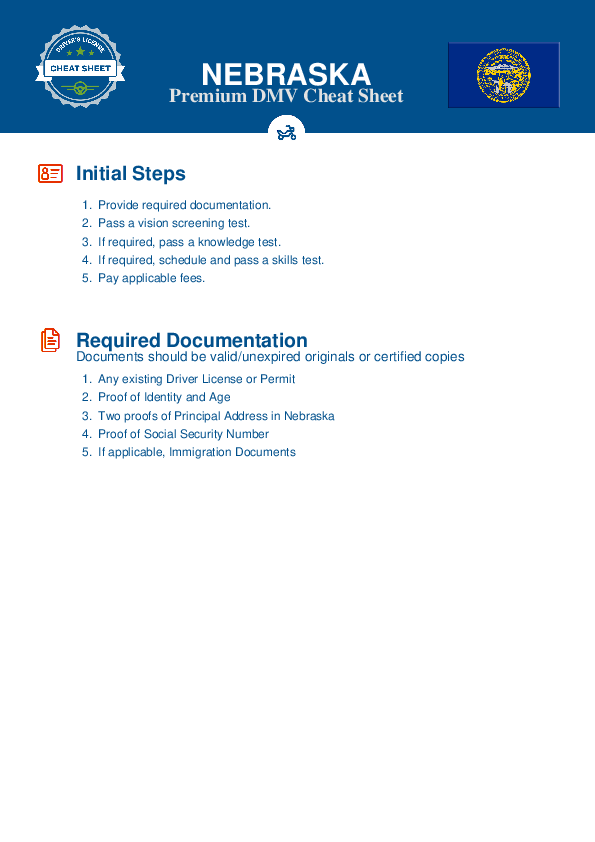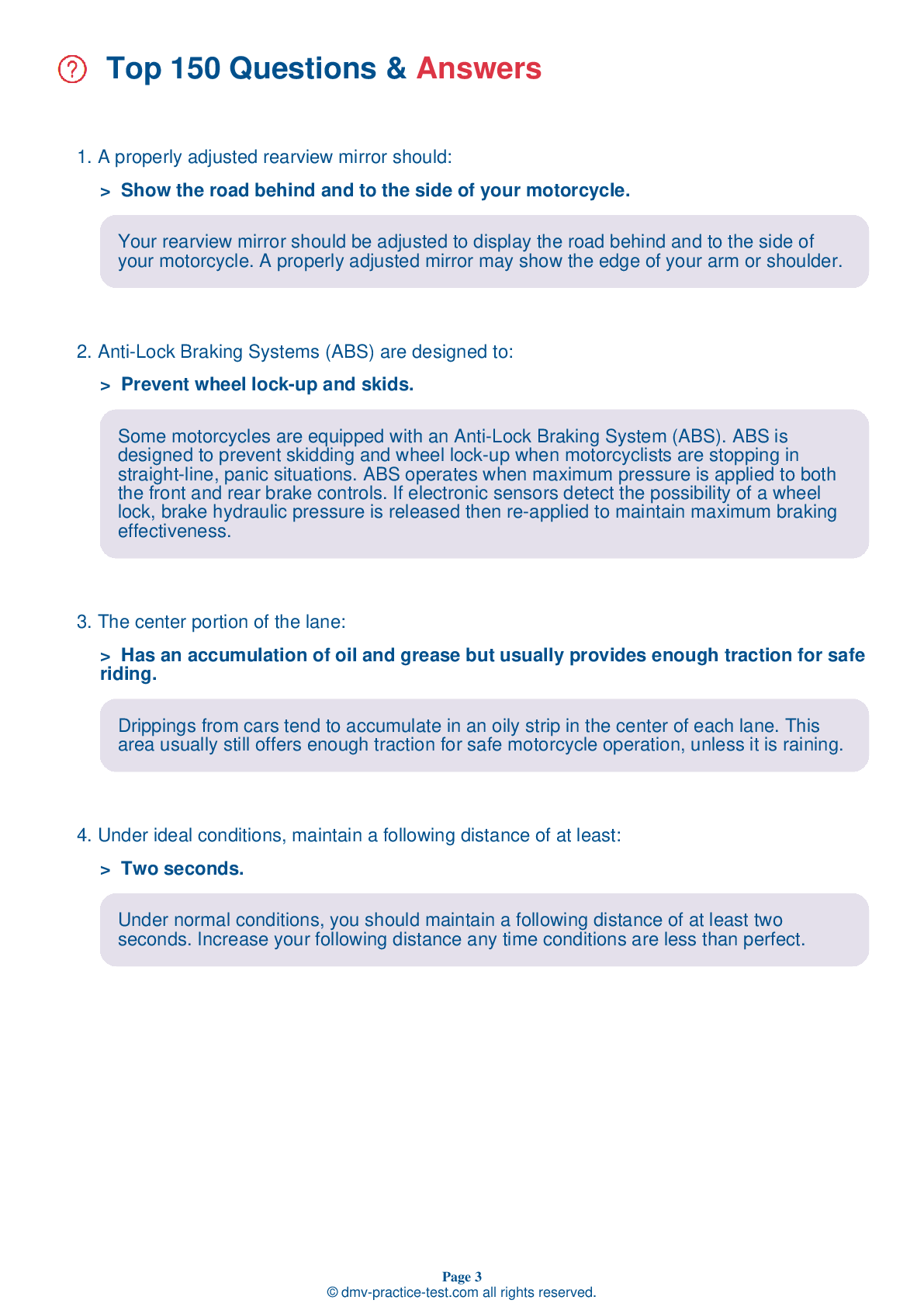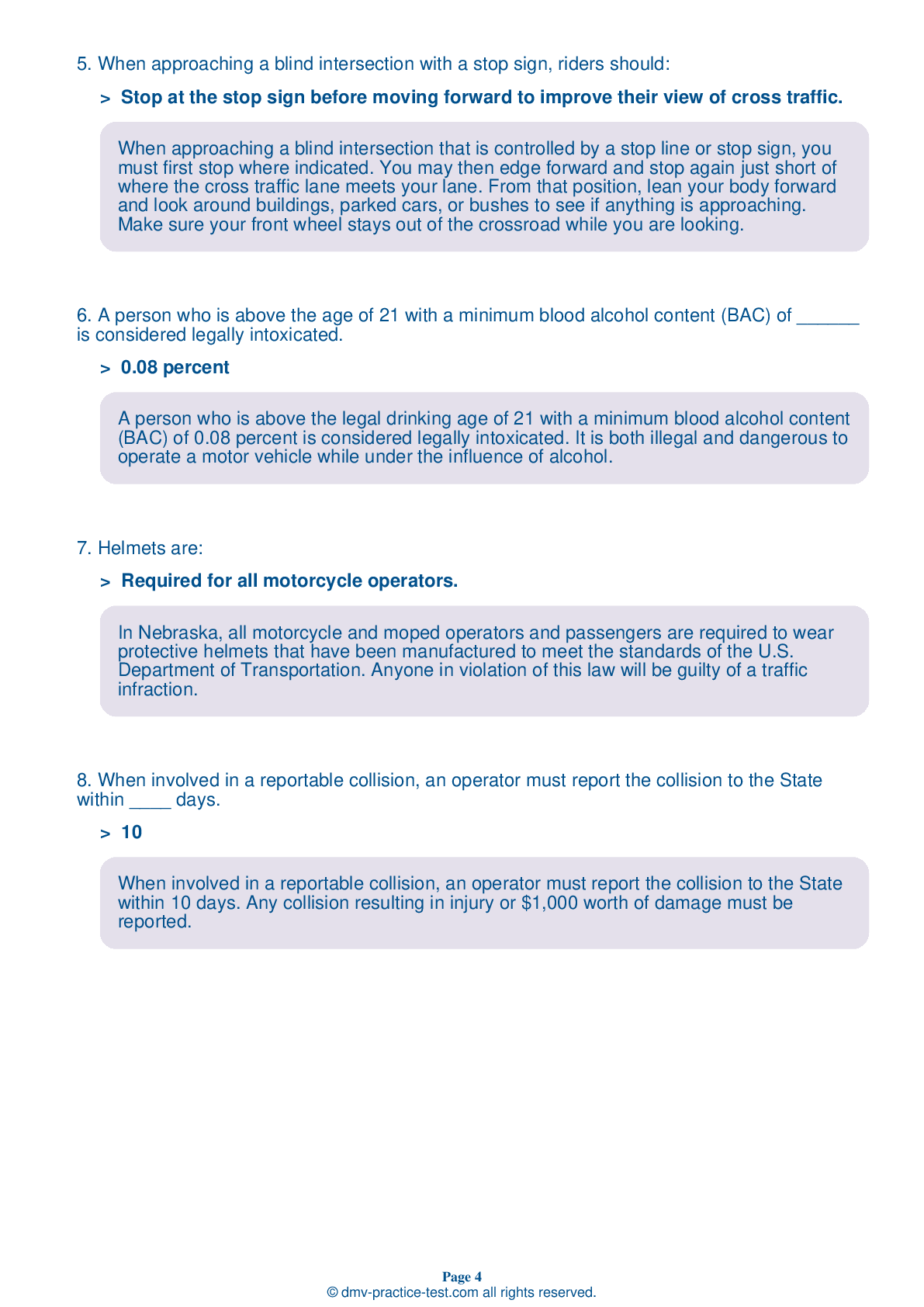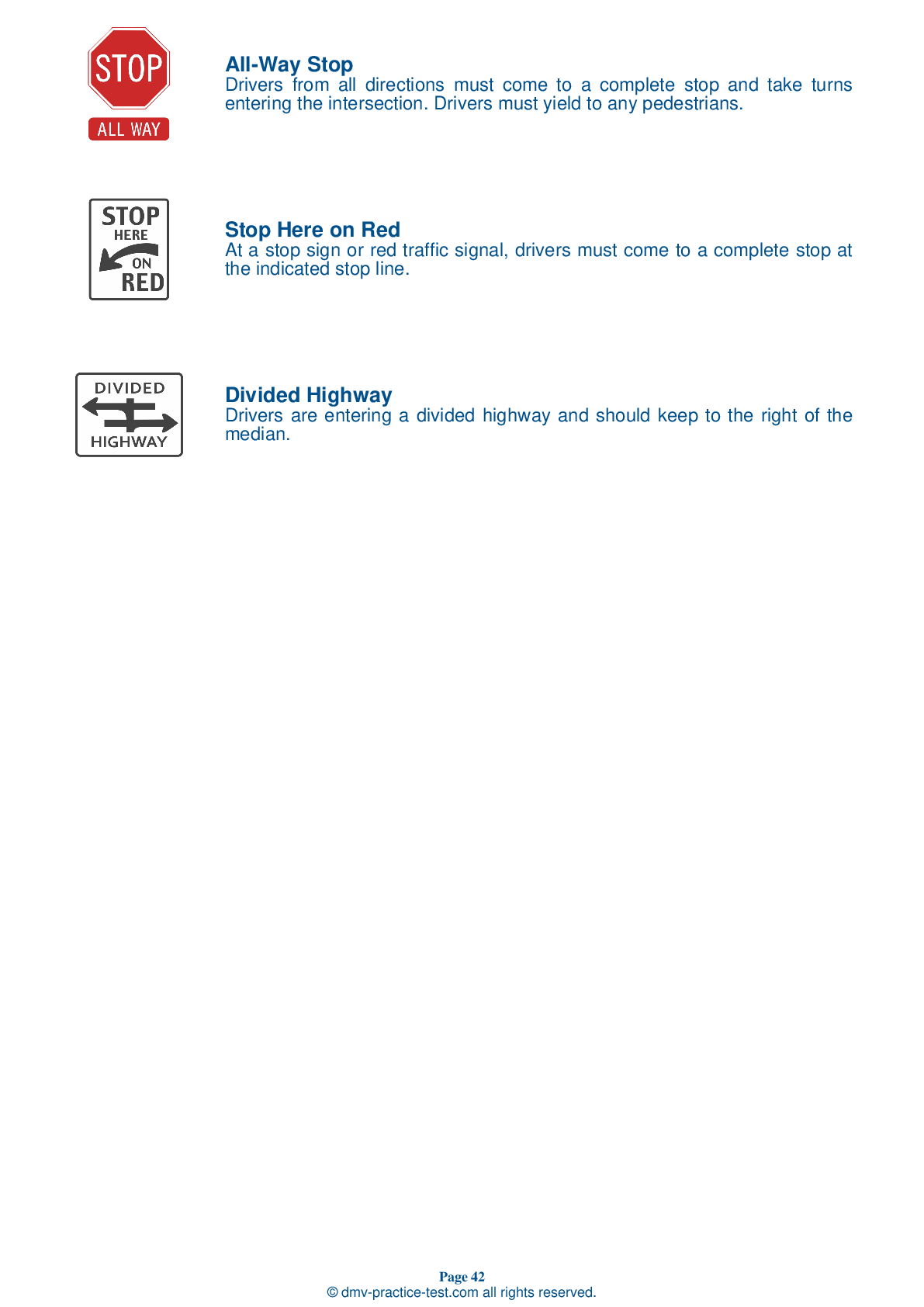DMV Permit Test #9
Motorcycle Test | License NE 2026 | FREE Online Practice! #9 Page 4 of 4
Take this FREE motorcycle test (license in NE 2026) to check your knowledge of the road rules. To improve your results, download a motorcycle handbook online, study theory, and practice for free on our website. Still worried about how to get a motorcycle license in Nebraska in 2026? Check our website for more sample tests, train as much as possible, and boost your grades!
25
20
16
19 . When riding with a passenger, you may need to adjust:
It is a good idea to add a few pounds of pressure to your tires if you plan to carry a passenger. Also, adjust the suspension to handle the additional weight.
20 . The greatest potential for conflict between you and other road users is located:
Intersections present the greatest potential for conflict between motorcycles and other traffic. A motorcyclist should use special caution when approaching or riding through an intersection.
21 . This sign means:
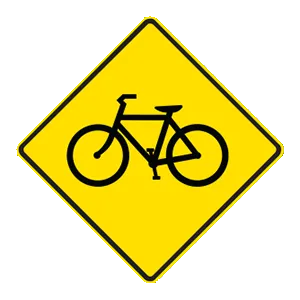
Stop ahead.
Warning signs prepare drivers for upcoming road conditions and hazards and are usually yellow with black markings. This sign alerts drivers to potential bicycle cross traffic.
22 . When parking a three-wheeled motorcycle on the side of the road, it should be:
Parked parallel to the curb.
Because of the limitations on mobility and motorcycle length, it is not practical to park your three-wheeled motorcycle on the side of a road at an angle with your rear wheel touching the curb, as you would with a two-wheeled motorcycle. Position your motorcycle in a parking space so you are parked parallel to the curb and set the parking brake.
23 . When turning a three-wheeled motorcycle, there is a tendency for:
All wheels to leave the pavement.
During a turn, inertia causes the motorcycle's center of gravity to shift sideways and outward toward the tip-over line. The reduced weight over the opposite side wheel can cause it to lift slightly. The tendency of the rear inside wheel to lift when turning is greater with increased speed.
24 . To lean your motorcycle to turn, you should:
Motorcycles must lean to turn. To make your motorcycle lean, press the handgrip on the same side as your desired turn.
25 . What message will be found on a red octagon-shaped sign?

An octagonal (eight-sided) sign always means "stop." You must always come to a complete stop at this sign.
Need Motorcycle Insurance? No problem!
Compare the best rates in Nebraska and find a personalized policy that meets your needs.
1. Are You Currently insured ?
2. Married ?
3. Do you own your Home?
4. Have you or a Family Member Honorably Served in U.S. Military ?
5. Your Name
6. Age
7. Zip code
Ranked by best match
2026 Nebraska | Frequently Asked Questions
In Nebraska, to acquire a motorcycle license, you must first hold a Provisional Operator's Permit (POP) or an Operator's License. You then have to pass a motorcycle safety course or a written and drive test at a DMV office. If you're under 18, you must have a POP for at least 12 months and no traffic violations in the last six months.
In Nebraska, the minimum age for obtaining a motorcycle driver's license is 17. However, applicants who are under 18 years old are required to complete a state-approved motorcycle safety course and have parental consent before they can apply for a motorcycle license or endorsement.
Yes, in Nebraska, you need a dedicated motorcycle license or a Class M endorsement on your regular driver's license to legally ride a motorcycle. To get this, you must pass a vision test, a written knowledge test, and a drive test. However, if you complete an approved motorcycle safety course, the testing requirements may be waived.
To apply for a motorcycle driver's license in Nebraska, you need to present several documents: proof of identity (like a birth certificate or passport), proof of Social Security number, two proofs of Nebraska residential address, and proof of U.S. citizenship or lawful status. If you're under 18, parental consent is also required.
Yes, in Nebraska, you will need to take a written exam to obtain a motorcycle license. However, if you successfully complete a state-approved motorcycle safety course, the written and drive test requirements may be waived. It's recommended to study the Nebraska Motorcycle Operator Manual to prepare for the written exam.
The Nebraska motorcycle written test covers a wide range of subjects related to safe motorcycle operation. These include understanding road signs and signals, rules of the road, safe riding techniques, how to handle hazardous conditions, and protective gear. It also tests knowledge on motorcycle-specific laws in Nebraska. Studying the Nebraska Motorcycle Operator Manual is recommended.
Yes, in Nebraska, if you successfully complete a Motorcycle Safety Foundation (MSF) rider course, you can waive the written and drive tests required for motorcycle endorsement. However, you need to submit your MSF course completion card to the DMV within one year of the course completion date.
To enroll in a motorcycle training course in Nebraska, you need to contact an approved training provider. These are often found at community colleges or private companies. You will likely need to pay a fee, which varies by provider. The course usually includes classroom instruction and practical riding exercises. Upon completion, you may be exempt from the DMV's written and road tests.
No, you don't need to own a motorcycle for the license test in Nebraska. You can use any motorcycle that's street-legal and in safe working condition, as long as you have permission to use it. However, you're responsible for bringing the motorcycle to the test site. Make sure it's insured and registered before the test.
Yes, you can use a friend's motorcycle for the driver's license evaluation in Nebraska. However, the motorcycle must be street-legal, registered, and insured. You'll also need to bring proof of insurance to the test. Remember that you must be comfortable and familiar with the motorcycle for the best chance of passing the test.
Yes, during the Nebraska motorcycle driving exam, you're tested on specific handling skills. These include your ability to start and stop, turn and swerve, balance, negotiate intersections, and react to hazards. The test also evaluates your understanding of road signs, signals, and rules. It's crucial to demonstrate control and safe driving practices throughout the exam.
Yes, in Nebraska, new motorcycle drivers under the age of 18 are required to hold a Provisional Operator's Permit (POP) for at least 12 months. During this period, they cannot carry any passengers and are prohibited from driving between midnight and 6 AM unless it's for school, work, or a religious activity. They must also remain violation-free during this period.
Yes, your Nebraska motorcycle license allows you to ride a motorcycle in other states. This is due to the Full Faith and Credit Clause of the U.S. Constitution, which requires each state to honor the public acts and judicial decisions of other states. However, while riding in other states, you must abide by their specific traffic laws and regulations.
Yes, in Nebraska, it is mandatory for all motorcycle riders and passengers to wear a helmet. The law applies regardless of age or experience level. The helmet must meet the Department of Transportation's safety standards. This law is in place to protect riders from serious injury in the event of an accident.
Yes, in Nebraska, there are two types of motorcycle licenses: Class M and Class O. Class M is specifically for motorcycles, while Class O is for motor vehicles including motorcycles. Both licenses require passing a written test and a drive test. The type of license you need depends on the specific type of vehicle you plan to operate.
Yes, in Nebraska, you can add supplementary endorsements to your motorcycle license. These endorsements may include additional permissions like operating a school bus, a commercial vehicle, or a motorcycle. Each endorsement requires its own test and certification. It's recommended to check with the Nebraska DMV for specific requirements.
Yes, the Nebraska Department of Motor Vehicles (DMV) provides the motorcycle written test in multiple languages. If English is not your first language, you can request to take the test in your preferred language. It's advisable to contact your local DMV office ahead of time to ensure they have the test in your desired language.
An effective strategy to prepare for the motorcycle license test in Nebraska is to study the state's Motorcycle Operator Manual thoroughly. It contains all the information you need for the test. Also, taking online practice tests can be very helpful as they simulate the actual test environment and help you familiarize yourself with the types of questions asked.
Yes, the motorcycle written exam in Nebraska can be taken in languages other than English. The Nebraska Department of Motor Vehicles offers the exam in Spanish. If you need the test in another language, you should contact the DMV directly to inquire about available translation services or assistance.
Yes, retaking is allowed in Nebraska if you don't pass the motorcycle written test on your first attempt. However, you must wait at least one day before retaking the test. Keep in mind that there may be additional fees for each retest, and the number of attempts may be limited. It's advisable to study thoroughly before each attempt.
